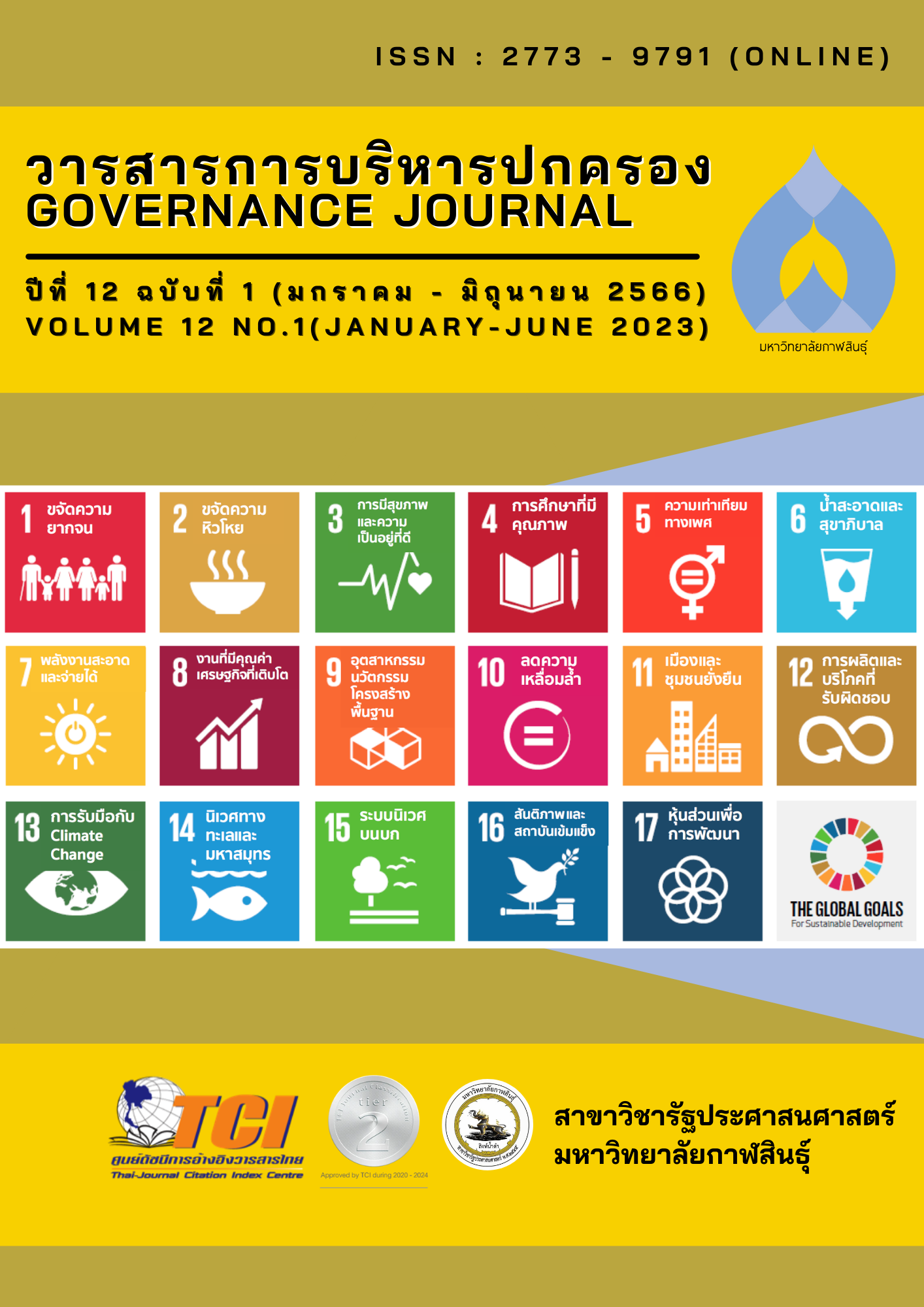การคุ้มครองสิทธิในข้อมูลส่วนบุคคลของลูกจ้างโรงงานอุตสาหกรรมจากการเก็บรวบรวมข้อมูลส่วนบุคคลเพื่อปฎิบัติตามมาตรการป้องกันโรคติดเชื้อโควิด 19 สำหรับโรงงานอุตสาหกรรม (Good Factory Practice (GFP)
DOI:
https://doi.org/10.14456/gjl.2023.4คำสำคัญ:
ข้อมูลส่วนบุคคล; ลูกจ้าง; โรงงานอุตสาหกรรม; พระราชบัญญัติคุ้มครองข้อมูลส่วนบุคคล พ.ศ. 2562; แนวปฏิบัติที่ดีทางอุตสาหกรรมบทคัดย่อ
การวิจัยนี้มีวัตถุประสงค์ เพื่อ (1) ศึกษาวิเคราะห์ว่ามาตรการ GFP ส่งผลกระทบในลักษณะการเก็บรวบรวมข้อมูลส่วนบุคคลของพนักงานในโรงงานอุตสาหกรรมอย่างไร (2) เพื่อศึกษาวิเคราะห์การตีความและประเด็นปัญหาทางกฎหมายในการปรับใช้ฐานความยินยอมตามข้อตกลงการใช้งานแพลตฟอร์มที่เกี่ยวเนื่องกับ GFP ได้แก่ TSC และ TST (3) เพื่อศึกษาวิเคราะห์การปรับใช้ฐานทางกฎหมายอันเป็นข้อยกเว้นของความยินยอม เพื่อเก็บรวบรวมข้อมูลส่วนบุคคลของพนักงานโรงงาน ตามข้อตกลงการใช้งานแพลตฟอร์มที่เกี่ยวเนื่องกับ GFP ได้แก่ TSC และ TST งานวิจัยนี้ใช้วิธีการวิจัยเชิงคุณภาพด้วยการวิเคราะห์เนื้อหาและการตีความข้อตกลงการใช้งานโดยวิเคราะห์การตีความกฎหมายไทยเปรียบเทียบกับกฎหมายสหภาพยุโรป ผลการศึกษาพบว่า (1) แพลตฟอร์ม TST กำหนดให้ผู้ใช้งานกรอกข้อมูลระบุตัว ข้อมูลพฤติกรรมและสุขภาพเพื่อประเมินความเสี่ยงของโรคติดต่อโควิด 19 แต่แพลตฟอร์ม TSC เก็บข้อมูลของพนักงานเฉพาะในส่วน ผู้ติดต่อหรือประสานงาน (2) ข้อตกลงแพลตฟอร์ม TST ข้อ 3.3 ขอความยินยอมจากผู้ใช้งาน แต่จากการนำองค์ประกอบของความยินยอมตามแนวทางสหภาพยุโรปและกฎหมายไทยมาวิเคราะห์ พบว่า ไม่สอดคล้องกับองค์ประกอบหลายประการ เช่น ความไม่สมดุลเชิงอำนาจต่อรอง การยินยอมที่เชื่อมโยงกับผลกระทบทางลบ ข้อตกลงแพลตฟอร์ม TSC มีเนื้อหาคล้ายคลึงกับ TST แต่ไม่ระบุถึงความยินยอมสำหรับพนักงานโรงงานที่เป็นผู้ติดต่อหรือประสานงาน (3) ข้อตกลงแพลตฟอร์ม TST ข้อ 3.2 ระบุข้อยกเว้นของความยินยอม 3 ฐาน คือ มาตรา 24 (3) มาตรา 26 (5) (ก) และ 26 (5) (ค) ซึ่งผลการวิเคราะห์ฐานทางกฎหมายชี้ให้เห็นว่า การอ้างอิงฐานดังกล่าวไม่สอดคล้องกับเงื่อนไขและหลักการตามกฎหมายคุ้มครองข้อมูลส่วนบุคคล ข้อตกลงแพลตฟอร์ม TSC มีเนื้อหาคล้ายคลึงกับ TST แต่ไม่ระบุถึงฐานทางกฎหมายสำหรับข้อมูลของพนักงานที่เป็นผู้ติดต่อหรือประสานงาน ผู้วิจัยจึงมีข้อเสนอแนะให้แก้ไขข้อตกลงการใช้บริการของ TST และ TSC และปรับเปลี่ยนการอ้างฐานทางกฎหมายโดยอาศัยความยินยอมจากพนักงานโรงงานที่เป็นผู้ใช้งานแพลตฟอร์มดังกล่าว
Downloads
เอกสารอ้างอิง
ภาษาไทย
กระทรวงอุตสาหกรรม. ข่าวกระทรวงอุตสาหกรรม, สกัดโควิดลามโรงงาน ก.อุตฯ ขอความร่วมมือ
โรงงานตรวจประเมินตนเองผ่านแพลตฟอร์มออนไลน์ Thai Stop Covid Plus และ Thai
Save Thai. (2564). สืบค้นเมื่อวันที่ 3 มิถุนายน 2565 จาก
https://www.industry.go.th/th/secretary-of-industry/7809.
กรมอนามัย. ไทยเซฟไทย. (2564: 1). ข้อตกลงและเงื่อนไขการใช้บริการ. สืบค้นเมื่อวันที่ 3 มิถุนายน
จาก https://savethai.anamai.moph.go.th/main.php.
กรมอนามัย. Thai Stop COVID+ (2564:2). ข้อตกลงและเงื่อนไขการใช้บริการ.
สืบค้นเมื่อวันที่ มิถุนายน 2565 จาก
https://stopcovid.anamai.moph.go.th/webapp/signup_agreement.php.
คณาธิป ทองรวีวงศ์. (2564). หลักกฎหมายคุ้มครองข้อมูลส่วนบุคคล. พิมพ์ครั้งที่ 1. กรุงเทพฯ:
สำนักพิมพ์นิติธรรม.
คณาธิป ทองรวีวงศ์. (2559). การปฏิรูปกฎหมายคุ้มครองข้อมูลส่วนบุคคลของไทยเพื่อเข้าสู่ประชาคม
อาเซียน. กรุงเทพฯ: สำนักงานเลขาธิการสภาผู้แทนราษฎร.
คณาธิป ทองรวีวงศ์. (ธันวาคม 2553). มาตรการทางกฎหมายในการคุ้มครองสิทธิในความเป็นอยู่
ส่วนตัว: ศึกษากรณีการรบกวนสิทธิในความเป็นอยู่ส่วนตัวโดยธุรกิจขายตรง. วารสารทาง
วิชาการบทบัณฑิตย์ เนติบันฑิตยสภาในพระบรมราชูปถัมภ์, 66 (4), 46-80.
คณาธิป ทองรวีวงศ์. (2565: 1). การคุ้มครองสิทธิมนุษยชนของนักเรียนในสถานศึกษาจากมาตรการ
ควบคุมโรคติดต่อโควิด 19 : ศึกษากรณีการอ้างฐานทางกฎหมายสำหรับประมวลผลข้อมูล
ส่วนบุคคลชนิดพิเศษของนักเรียนตามข้อตกลงการใช้งานแพลตฟอร์ม “ไทยเซฟไทย”, การ
ประชุมวิชาการระดับชาติ
IAMBEST ครั้งที่ 7, The 7th National Conference on Informatics, Agriculture, Management,
Business administration, Engineering, Science and Technology. 26-27 May
คณาธิป ทองรวีวงศ์. (2565:2). การคุ้มครองสิทธิมนุษยชนของนักเรียนในสถานศึกษาจาก มาตรการ
ป้องกันโรคติดต่อโควิด 19 (COVID-Free Setting): ศึกษากรณีความยินยอมนักเรียนในการใช้
งานแพลตฟอร์ม “ไทยเซฟไทย. วารสารครุศาสตร์ มหาวิทยาลัยราชภัฏยะลา, 1(1), 15-28.
คณาธิป ทองรวีวงศ์. (2565: 3). การคุ้มครองสิทธิในการให้ความยินยอมของครูและบุคลากรของ
สถานศึกษาในกรณีเก็บรวบรวมข้อมูลส่วนบุคคลของแพลตฟอร์ม “ไทยเซฟไทย” หลังการ
ประกาศให้โรคติดต่อโควิด 19 เป็นโรคติดต่อเฝ้าระวัง.
ภาษาอังกฤษ
Alan F, W. (1967). Privacy and Freedom. New York: Atheneu.
Arendt, H. (1973). The Human Condition. Chicago: University of Chicago Press.
Article 29 Working party of The European Union (2011). Opinion 15/2011 on the
definition of consent. Retrieved June 10, 2022 from
https://ec.europa.eu/justice/article-29/documentation/opinion-
recommendation/files/. Article 29 Working party of The European Union (2018).
Guidelines on consent under Regulation 2016/679. Retrieved June 10, 2022 from
https://ec.europa.eu/justice/article-29/documentation/opinion-
recommendation/files/.
Bloustein, E. (1984). Privacy as an Aspect of Human Dignity. “Philosophical Dimensions
of privacy: An Anthology”, Schoeman, Ferdinand (ed.), (UK: Cambridge
University Press.
Cate, F. H. (1995). “The EU Data Protection Directive, Information Privacy, and the
Public Interest”. Iowa Law Review, 80. 431-443.
Donnelly, J. (June 1982). “Human Rights and Human Dignity”. The American Law
Review, 76(2). 303-316.
Fromholz, J. M. (2000). “The European Union data privacy directive”. Berkeley
technology law journal, 15(1). 460-484. Hall Law Review, Vol. 47, No. 4(2). 512-
Falletti, E. (2021). Privacy Protection, Big Data Gathering and Public Health Issues:
COVID-19 Tracking App Use in Italy. Retrieved June 10, 2022 from
https://ssrn.com/abstract=3758800.
Information Commissioner’s Office (ICO), UK (2018). Guide to the General Data
Protection Regulation (GDPR). Retrieved June 10, 2022 from
http://www.ico.org.uk/for-organisations/guide-to-data-Protection.
Kuner, Christopher (2018). International Organizations and the EU General Data
Protection Regulation, International Organizations Law Review, Vol 75. 780-798.
Rubenfield, J. (1989). “The Right of Privacy”. Harvard Law Review, 102(4). 737- 807.
Journal of Communication & Strategy, No.97, 1st quarter. 41-58.
Schoeman, F. (1984). Privacy: Philosophical Dimensions of literature. “Philosophical
Dimensions of privacy: An Anthology”, Schoeman, Ferdinand (ed.), UK:
Cambridge University Press.
Solove, D. (January 2006). “A Taxonomy of Privacy”. University of Pennsylvania Law
Review. 154(3). 477-560.
Swire, P. (2018). The Data Protection Commissioner and Facebook Ireland Limited and
Maximillian Schrems, Affidavit of Peter Swire Georgia Tech Scheller College of
Business Research Journal, Vol 5. 312-358.
Warren D & Brandies D. (1890). “The Right to Privacy”. Harvard Law Review, 4(5). 193-
Translated Thai References
Bureau of Health Promotion, Department of Health. (2021). Advice on public health to
prevent and monitor the spread of the corona virus 2019 (COVID-19) for
business establishments or factories (Good Factory Practice). Retrieved
Retrieved June 3, 2022. from http://covid19. anamai.moph. go.th/en/
establishments/.Department of Health. Thai Safe Thai. (2021: 1). Terms and
conditions for using the service.
Retrieved June 3, 2022 from https://savethai.anamai.moph.go.th/main.php.
Department of Health. Ministry of Public Health. (2021). Safety Measures for
Organizations (Covid Free Setting), Retrieved June 3, 2022 from
https://covid19.anamai.moph.go.th/web-upload/.
Department of Health. Thai Stop COVID+. (2021:2). Terms and conditions for using the
service. Retrieved June 3, 2022 from จาก
https://stopcovid.anamai.moph.go.th/webapp/signup_agreement.php.
Kanathip Thongrawewong. (2021). Principles of Personal Data Protection Laws. 1st
edition. Bangkok: Nititham Publishing.
Kanathip Thongrawewong. (2016). Reform of Thai personal data protection law to enter
the community ASEAN. Bangkok: The Secretariat of the House of
Representative.
Kanathip Thongrawewong. (2010). Legal measures to protect the right to privacy: a
study.The case of interference with the right to privacy by the direct selling
business. Bot Bandit Journal National Institute of Education under the Royal
Patronage, 66 (4), 46-80.
Kanathip Thongrawewong. (2022: 1). Human rights protection of students in educational
institutions from control measures COVID-19 communicable disease: a case
study of legal bases for processing special category of personal data of student
according to the terms of use of the platform "Thai Save Thai", proceedings of The 7th National Conference on Informatics, Agriculture, Management, Business
administration, Engineering, Science and Technology. 26-27 May 2022.
Kanathip Thongrawewong. (2022:2). Protection of the human rights of students in
educational institutions from preventive measures of COVID-19 Communicable
Disease (COVID-Free Setting): A case study of student consent to use the
platform. "Thai Save Thai". Journal of Education, Yala Rajabhat University, 1(1),
-28.
Kanathip Thongrawewong. (2022:3). Protection of the right to consent of teachers and
school personnel in the case of collecting personal data on the "Thai Safe
Thai" platform after the declaration of the communicable disease COVID-19as
communicable disease surveillance, Proceedings of The 4th National Academic
Conference on Administration, Management, Education and Interdisciplinary
Studies (NCAME 2022), 16 December 2022.
Ministry of Industry. Ministry of Industry news, Preventing COVID-19 spreading to factories
Ministry of Industry requests cooperation from inspection factories Self-assessment
via online platforms Thai Stop Covid Plus and Thai Save Thai. (2021). Retrieved June 3, 2022 from https://www.industry.go.th/th/secretary-of-industry/7809.
ดาวน์โหลด
เผยแพร่แล้ว
รูปแบบการอ้างอิง
ฉบับ
ประเภทบทความ
สัญญาอนุญาต

อนุญาตภายใต้เงื่อนไข Creative Commons Attribution-NonCommercial-NoDerivatives 4.0 International License.








